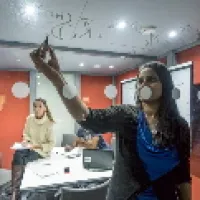About this course
Discover how English has developed through history and how it varies in different societies. You'll explore the language, its structure and the linguistic science behind it. You can also choose from a wide range of modules that follow your interests and career goals in the subject. We have one of the UK’s leading Languages, Cultures & Linguistics department.
This English language and linguistics degree will give you an advanced knowledge of contemporary English, its development, systems and use around the world. You'll learn analytical, research and personal skills relevant to a range of careers.
You’ll explore topics like:
- sociolinguistics
- language change
- language acquisition
- psycholinguistics
- English language teaching
- world Englishes
You can also study a foreign language and take modules in related disciplines, such as sociology, psychology and English literature.
In your final year, you’ll write a dissertation specialising in an area that interests you, based on your studies in years 1 and 2. This will use the skills you developed over the rest of the course.
This course will give you the training and expertise that are of special interest to many employers. It provides the knowledge and skills to follow a wide range of careers.
You will also have access to our Digital Humanities Hub and support from our team of expert academics and technicians.
Through the hub, you can investigate how technology can enhance the study of languages, cultures and linguistics. This includes:
- creating immersive virtual experiences of intercultural and multilingual environments
- using specialist software to analyse speech sounds or large-scale text data
- explore the differences between human and machine translation
This course is available as a 4-year variant with a year abroad in countries such as America, Canada, South Korea, Germany and more. This is a good opportunity to spend a year studying at a partner university.
We regularly review our courses to ensure and improve quality. This course may be revised as a result of this. Any revision will be balanced against the requirement that the student should receive the educational service expected. Find out why, when, and how we might make changes.
Our courses are regulated in England by the Office for Students (OfS).
Learn more about these subject areas

I’ve had two Linguist roles now where what I learnt in my degree was essential and used every day. The nature of the course’s flexibility also gave me breadth as well as in-depth knowledge on my areas of interest which were particularly useful.

I was fortunate enough to be taught by the most incredible linguistics department, whose passion for their research really inspired and motivated me to pursue my interests and work my hardest.
Course location
This course is based at Avenue.
Awarding body
This qualification is awarded by the University of Southampton.
Download the Course Description Document
The Course Description Document details your course overview, your course structure and how your course is taught and assessed.
Entry requirements
For Academic year 202526
A-levels
ABB including English Language or another relevant essay writing subject* in Humanities or Social Sciences
A-levels additional information
Offers typically exclude General Studies and Critical Thinking. Relevant essay-writing subjects include English Language and Literature, English Literature, French, German, History, Italian, Latin, Philosophy, Politics, Psychology, Sociology, Spanish, Law, Religious Studies.
A-levels with Extended Project Qualification
If you are taking an EPQ in addition to 3 A levels, you will receive the following offer in addition to the standard A level offer: BBB including English Language or another relevant essay writing* subject in Humanities or Social Sciences and grade A in the EPQ
A-levels contextual offer
We are committed to ensuring that all applicants with the potential to succeed, regardless of their background, are encouraged to apply to study with us. The additional information gained through contextual data allows us to recognise an applicant's potential to succeed in the context of their background and experience. Applicants who are highlighted in this way will be made an offer which is lower than the typical offer for that programme.
International Baccalaureate Diploma
Pass, with 32 points overall with 16 points at Higher Level, including 5 at Higher Level in English Language or another relevant essay writing subject* in Humanities or Social Sciences
International Baccalaureate Diploma additional information
Offers typically exclude General Studies and Critical Thinking. Relevant essay-writing subjects include English Language and Literature, English Literature, French, German, History, Italian, Latin, Philosophy, Politics, Psychology, Sociology, Spanish, Law, Religious Studies.
International Baccalaureate contextual offer
We are committed to ensuring that all learners with the potential to succeed, regardless of their background, are encouraged to apply to study with us. The additional information gained through contextual data allows us to recognise a learner’s potential to succeed in the context of their background and experience. Applicants who are highlighted in this way will be made an offer which is lower than the typical offer for that programme.
International Baccalaureate Career Programme (IBCP) statement
Offers will be made on the individual Diploma Course subject(s) and the career-related study qualification. The CP core will not form part of the offer. Where there is a subject pre-requisite(s), applicants will be required to study the subject(s) at Higher Level in the Diploma course subject and/or take a specified unit in the career-related study qualification. Applicants may also be asked to achieve a specific grade in those elements. Please see the University of Southampton International Baccalaureate Career-Related Programme (IBCP) Statement for further information. Applicants are advised to contact their Faculty Admissions Office for more information.
BTEC
Distinction, Distinction in the BTEC National Extended Diploma plus B in A level English Language or another relevant essay writing subject* in Humanities or Social Sciences Distinction, Distinction in the BTEC National Diploma plus B in A level English Language or another relevant essay writing subject* in Humanities or Social Sciences Distinction in the BTEC National Extended Certificate plus AB at A level to include English Language or another relevant essay writing subject* in Humanities or Social Sciences
RQF BTEC
We are committed to ensuring that all learners with the potential to succeed, regardless of their background, are encouraged to apply to study with us. The additional information gained through contextual data allows us to recognise a learner’s potential to succeed in the context of their background and experience. Applicants who are highlighted in this way will be made an offer which is lower than the typical offer for that programme.
Additional information
Relevant essay-writing subjects include English Language and Literature, English Literature, French, German, History, Italian, Latin, Philosophy, Politics, Psychology, Sociology, Spanish, Law, Religious Studies.
QCF BTEC
Distinction, Distinction in the BTEC Extended Diploma plus B in A level English Language or another relevant essay writing subject* in Humanities or Social Sciences Distinction, Distinction in the BTEC Diploma plus B in A level English Language or another relevant essay writing subject* in Humanities or Social Sciences Distinction in the BTEC Subsidiary Diploma plus AB at A level to include English Language or another relevant essay writing subject* in Humanities or Social Sciences
We are committed to ensuring that all learners with the potential to succeed, regardless of their background, are encouraged to apply to study with us. The additional information gained through contextual data allows us to recognise a learner’s potential to succeed in the context of their background and experience. Applicants who are highlighted in this way will be made an offer which is lower than the typical offer for that programme.
Access to HE Diploma
60 credits with a minimum of 45 credits at Level 3, of which 30 must be at Distinction and 15 credits at Merit, plus 6 Distinctions in English Language or another relevant essay writing subject* in Humanities or Social Sciences
Access to HE additional information
Offers typically exclude General Studies and Critical Thinking. Relevant essay-writing subjects include English Language and Literature, English Literature, French, German, History, Italian, Latin, Philosophy, Politics, Psychology, Sociology, Spanish, Law, Religious Studies.
Irish Leaving Certificate
Irish Leaving Certificate (first awarded 2017)
H1 H2 H2 H2 H3 H3 including English Language or another relevant essay writing subject* in Humanities or Social Sciences
Irish Leaving Certificate (first awarded 2016)
A2 A2 B1 B1 B2 B2 including English Language or another relevant essay writing subject* in Humanities or Social Sciences at B1
Irish certificate additional information
Offers typically exclude General Studies and Critical Thinking. Relevant essay-writing subjects include English Language and Literature, English Literature, French, German, History, Italian, Latin, Philosophy, Politics, Psychology, Sociology, Spanish, Law, Religious Studies.
Scottish Qualification
Offers will be based on exams being taken at the end of S6. Subjects taken and qualifications achieved in S5 will be reviewed. Careful consideration will be given to an individual’s academic achievement, taking in to account the context and circumstances of their pre-university education.
Please see the University of Southampton’s Curriculum for Excellence Scotland Statement (PDF) for further information. Applicants are advised to contact their Faculty Admissions Office for more information.
Cambridge Pre-U
D3 M2 M2 in three principal subjects including English Language or another relevant essay writing subject* in Humanities or Social Sciences
Cambridge Pre-U additional information
Offers typically exclude General Studies and Critical Thinking. Relevant essay-writing subjects include English Language and Literature, English Literature, French, German, History, Italian, Latin, Philosophy, Politics, Psychology, Sociology, Spanish, Law, Religious Studies.
Welsh Baccalaureate
ABB from 3 A levels including English Language or another relevant essay writing subject* in Humanities or Social Sciences or AB from two A levels including English Language or another relevant essay writing subject* in Humanities or Social Sciences and B from the Advanced Welsh Baccalaureate Skills Challenge Certificate
Welsh Baccalaureate additional information
Offers typically exclude General Studies and Critical Thinking. Relevant essay-writing subjects include English Language and Literature, English Literature, French, German, History, Italian, Latin, Philosophy, Politics, Psychology, Sociology, Spanish, Law, Religious Studies.
Welsh Baccalaureate contextual offer
We are committed to ensuring that all learners with the potential to succeed, regardless of their background, are encouraged to apply to study with us. The additional information gained through contextual data allows us to recognise a learner’s potential to succeed in the context of their background and experience. Applicants who are highlighted in this way will be made an offer which is lower than the typical offer for that programme.
T-Level
Not accepted for this course.
Other requirements
GCSE requirements
Applicants must hold GCSE English language (or GCSE English) (minimum grade 4/C) and mathematics (minimum grade 4/C)
Find the equivalent international qualifications for our entry requirements.
English language requirements
If English isn't your first language, you'll need to complete an International English Language Testing System (IELTS) to demonstrate your competence in English. You'll need all of the following scores as a minimum:
IELTS score requirements
- overall score
- 6.5
- reading
- 6.0
- writing
- 6.0
- speaking
- 6.0
- listening
- 6.0
We accept other English language tests. Find out which English language tests we accept.
If you don’t meet the English language requirements, you can achieve the level you need by completing a pre-sessional English programme before you start your course.
You might meet our criteria in other ways if you do not have the qualifications we need. Find out more about:
- our Ignite your Journey scheme for students living permanently in the UK (including residential summer school, application support and scholarship)
- skills you might have gained through work or other life experiences (otherwise known as recognition of prior learning)
Find out more about our Admissions Policy.
Foundation programmes for international students
A foundation programme will give you the language skills and subject knowledge you need if you're not qualified for direct entry to your chosen undergraduate course.
You'll progress to your chosen course after successfully completing the foundation programme.
Find out more about undergraduate foundation programmes for international students.
Got a question?
Please contact our enquiries team if you're not sure that you have the right experience or qualifications to get onto this course.
Email: enquiries@southampton.ac.uk
Tel: +44(0)23 8059 5000
Course structure
The course combines compulsory and optional modules. This lets you tailor your learning to suit your interests and ambitions, with the level of choice increasing across the three years of study.
You can combine modules from the Modern Languages & Linguistics department with modules from other disciplines. This results in many unique versions of the degree.
Year 1 overview
You’ll develop your English language analytical skills and see how history and society have changed it. You’ll learn the linguistic tools and study sound, structure and meaning.
You will take modules in:
- the history of the English language
- attitudes and ideologies around English
- global Englishes
- phonetics and phonology
- morpho-syntax, semantics and pragmatics
- language acquisition
You'll choose optional modules on both language and linguistics such as:
- understanding culture
- understanding history and society
Year 2 overview
You’ll explore how English is used, how it works and how it’s spoken in different cultures. You'll focus on language variation and change, acoustic phonetics and syntax.
Options include subjects such as:
- psycholinguistics
- gender and society
- corpus linguistics
- discourse analysis
- multilingualism
- language and power
From year 2, students can also choose to either take up a new language or continue a language they previously studied at GSCE or A level.
Finally, year 2 offers students the opportunity to take modules in Digital Humanities including:
- data environmentalism
- data, cultures and justice
- queering the digital
Year 3 overview
You’ll write a dissertation on a topic that interests you.
You can also choose modules such as:
- sociophonetics
- advanced sociolinguistic theory
- language and speech disorders
- second language acquisition
- language in urban centres
- rethinking autism
- advanced global Englishes
- language testing and assessment
Want more detail? See all the modules in the course.
Modules
The modules outlined provide examples of what you can expect to learn on this degree course based on recent academic teaching. As a research-led University, we undertake a continuous review of our course to ensure quality enhancement and to manage our resources. The precise modules available to you in future years may vary depending on staff availability and research interests, new topics of study, timetabling and student demand. Find out why, when and how we might make changes.
For entry in academic year 2025 to 2026
Year 1 modules
You must study the following modules in year 1:
Academic Skills for Modern languages and Linguistics students
This module is designed to ease the transition from A-level to the first year of a single or combined honours degree programme by setting out clearly what we expect of you at undergraduate level and equipping you with the resources to be able to operate a...
Applications of Linguistics
This unit will introduce you to the main areas relevant to applied language studies.
Elements of Linguistics - Sound, Structure and Meaning
This module provides an introduction to linguistic approaches to sound, structure and meaning in the branches of linguistics known as phonetics and phonology, morphology, syntax, semantics and pragmatics.
From English to Englishes
This module introduces you to the spread of English from its historical origins to colonial and postcolonial contexts and, further, to current global contexts. It explores sociolinguistic issues and debates centering on the development of English. It enga...
Language Acquisition
You may have asked yourself how children learn their first language or whether some animals can speak just like humans do. People often wonder whether there are any lifelong benefits of bilingualism as well. This module introduces you to the field of lang...
Language, Ideologies and Attitudes
This module explores language in its social context. The main aim of this module is to introduce you to key research approaches to the study of language attitudes and ideologies and to encourage you to reflect on how attitudes and beliefs about language e...
Structure of English
If English is your native language, or even if you learned it as an additional language, you may not be aware of the structure of its sounds, words, phrases and sentences. In this module you will learn to describe how English sentences are constructed and...
The Making of Modern English
The module looks at the development of the English language, and examines its relationship with other, potentially rival, languages that have been spoken in the British Isles. It examines the effect of successive waves of conquest on the sociolinguistic s...
You must also choose from the following modules in year 1:
Literary Transformations
Why have some stories gripped the imagination of writers, musicians, and artists across cultures and centuries? And what does the emergence and constant re-emergence of such stories tell us about ourselves and others, past and present? What do readers and...
Understanding Culture
This introductory course will give you an overview of some approaches to, and topics within, cultural and literary studies. You will spend time on close textual reading, as well as on broader cultural analysis. It aims to encourage you to experiment in c...
Understanding History and Society
This module will introduce you to studying questions of history, society and culture through the prism of Southampton in order that you can apply those approaches to the study of cities in the French, Spanish and German-speaking world.
World Dramas
In this module, you will learn how to approach dramatic texts in a way that takes into consideration their place in the world as a complex political, economic, and cultural network. We will focus on questions such as: • What is the difference between r...
Year 2 modules
You must study the following modules in year 2:
Sound and Voice
This module builds on the basic concepts of articulatory phonetics introduced in the first year, and introduces theory and methodology of acoustic science for the study of the production and perception of speech sounds.
Syntax: Studying Language Structure
This module will provide introduce you to the study of syntax within current linguistic theory.
Variation and Change in English
This module takes an empirical approach to questions such as: - Are there patterns of speech and language associated with males and females in varieties of English? - What is the role of teenagers in the propagation of change in English? - After a...
You must also choose from the following modules in year 2:
Corpus Linguistics: Working with large-scale text data
In this module, we introduce corpus linguistics as an approach to and method for analysing large-scale text data. We will develop an understanding of building and curating datasets, annotating data, and using quantitative and statistical measures for lang...
Data, Culture, and Justice
Data organise our present and shape our future. Those data are never neutral because they are the product of human labour, of choices made by people about what data to record, how to record it, and who is best equipped to do that recording. Drawing on wor...
Discourse Analysis
This module highlights and analyses the link between language structure and its situation of occurrence.
English on the Move
English has always been on the move. As a literary language, it has not only travelled from and back to England; lines of influence between texts, authors, publishers, editors, book technologies, and readers traverse the globe in multiple directions, bet...
Experiment!
What does it mean to make literature new? What forms and reformations have offered starting points for rethinking literary convention? In this module, you will explore the revolutions, innovations, and boundary-crossings that have taken place in literatur...
Globalisation: Culture, Language and The Nation State
This module will problematize the concept of globalisation and explore and develop an understanding of its meaning in economic, political and cultural terms. Furthermore, we will examine the ideological struggle between competing forces over the nature an...
Health, Culture, and Discrimination
Deadly illnesses have frequently been invested with a great deal of symbolic and cultural significance. This interdisciplinary module will introduce you to how various diseases and conditions (AIDS, cancers, obesity, Covid-19, and mental health issues and...
Images of Women
Cultural representations of women shed important light on notions of female subjectivity, sexuality and racial identity in the modern world. Medical discourses on gender, mental pathology and the rise of modern feminism are just some of the pivotal histor...
Intercultural Communication in a Global World
In a world of fast and easy communication, we are increasingly working and studying alongside people from different cultural and linguistic backgrounds. Understanding our intercultural encounters allows us to develop awareness of ourselves and others, as ...
Language, Power and Institutions: how linguistic practices can shape our lives
This module will introduce you to the making of institutions through language. We will investigate the links between language, institutions, and power to understand, how institutions are not only shaping the language used by members and users of instituti...
Learning about Culture: Introduction to Ethnography
Multilingualism
This module will introduce you to the notion of ‘Multilingualism’, how this is understood and represented in different ways, and why it matters to you. You will explore how people become multilingual, and whether it makes a difference if multilinguals are...
Psycholinguistics
This module examines different sub-topics in psycholinguistics which help to understand what the relationship between language and the human mind might be.
Queering the Digital
In this module, we will investigate and reflect on the various entanglements between Queerness and digital technologies. Drawing from foundational concepts in Queer theory and gender studies scholarship, this module deconstructs and reconceptualises domin...
Revolutions in English Literature
Revolutions would break, remake, and reform societies on both sides of the Atlantic from the disruptions of the English Civil War to the global conflicts of the Napoleonic Empire. Revolutions may be those sudden changes in political life that men have tra...
Speech Acts
How do writers activate and amplify the sonic properties of language? Why do artists use vocal performance of text in video art? How can text ‘perform’ on the page (or onscreen), and what does it mean for language to be performative? What does writing for...
Teaching English as a Foreign Language
This module will introduce you to key issues, concepts and methods in teaching English as a second/foreign language.
The EU and European Identity
The course seeks to provide an overview of the evolution of the European Union (EU) from its early stages to the present. In so doing, it examines the ideas and history of the EU, the institutions of the EU, examples of specific issue areas and the presen...
The Worlding of English Literature
Since 1800, new modes of transport and communication, commerce and violence, have remade the world. As empires expanded and contracted, and as the relationships between states and individuals were repeatedly reconfigured and tested, ways of conceptualisin...
Year 3 modules
You must study the following module in year 3:
You must also choose from the following modules in year 3:
English as a Global Language
This module explores the rise of English as a global language focusing on the factors that have led to, and the issues that have arisen from, its dominant status. You will learn about the interrelation between globalisation, standardisation and variabilit...
Corpus Linguistics: Working with large-scale text data
In this module, we introduce corpus linguistics as an approach to and method for analysing large-scale text data. We will develop an understanding of building and curating datasets, annotating data, and using quantitative and statistical measures for lang...
Creative Writing in Schools
Are you interested in helping young people study English? This module will introduce you to teaching creative writing in secondary schools by providing training in effective classroom management and guidance on designing lesson plans for studying fiction ...
Data Environmentalism
Data is material. It is produced by people, it is made possible by resource extraction, it needs power to survive, it inhabits and resculpts the landscape. The use of data, then, contributes to climate catastrophe, but that role can be hard to see, hidden...
Data, Culture, and Justice
Data organise our present and shape our future. Those data are never neutral because they are the product of human labour, of choices made by people about what data to record, how to record it, and who is best equipped to do that recording. Drawing on wor...
Health, Culture, and Discrimination
Deadly illnesses have frequently been invested with a great deal of symbolic and cultural significance. This interdisciplinary module will introduce you to how various diseases and conditions (AIDS, cancers, obesity, Covid-19, and mental health issues and...
Language Testing and Assessment in Society
This module develops awareness of how language testing and assessment have developed in educational and wider social contexts. It focusses on both purposes and processes of language testing and assessment, and critically examines applications in policy ar...
Language and Speech Disorders
This module focuses on language and communication disorders, both developmental and acquired. It builds on your linguistic and psycholinguistic knowledge developed in other modules you have followed in your programme. It will also examine the disorders...
Language and the City
One of the socially and culturally most significant consequences of transnational mobility is that urban populations in particular are increasingly multilingual: in global cities such as London, New York and Berlin there are speakers of hundreds of differ...
Language, Power and Institutions: how linguistic practices can shape our lives
This module will introduce you to the making of institutions through language. We will investigate the links between language, institutions, and power to understand, how institutions are not only shaping the language used by members and users of instituti...
Queering the Digital
In this module, we will investigate and reflect on the various entanglements between Queerness and digital technologies. Drawing from foundational concepts in Queer theory and gender studies scholarship, this module deconstructs and reconceptualises domin...
Rethinking Autism
This module offers you an opportunity to learn about autism through the lens of neurodiversity. Neurodiversity offers a new perspective on our understanding of autism by emphasising the strengths and capabilities of autistic people, as well as challenging...
Second Language Acquisition
This module provides an insight into the cognitive processes involved in the acquisition of language. Different theories of first and second language acquisition will be examined and critically assessed in the light of empirical evidence. Various factors ...
Shakespeare Then and Now
Has Shakespeare aged well? From the boys in wigs on the Elizabethan stage to the digital wizardry of the twenty-first century, the technology as well as the ideology that informs Shakespearean performance keeps evolving—sometimes in unexpected ways. This ...
Sociophonetic Project Module
This final year module builds on the theoretical grounding students gain in LING 2011 Variation and Change in English and the instrumental analysis techniques from LING 2008 Sound and Voice. Through a series of computer, lab-based sessions, students test ...
Writing Queerness
Once upon a time, no one called themselves queer; now it names everything from a kind of person to a type of weather. Queerness seems necessary, ubiquitous, paradoxical – but why? Ranging from the eighteenth century to the present day, this module will ex...
Learning and assessment
The learning activities for this course include the following:
- lectures
- classes and tutorials
- coursework
- individual and group projects
- independent learning (studying on your own)
Course time
How you'll spend your course time:
Year 1
Study time
Your scheduled learning, teaching and independent study for year 1:
How we'll assess you
- debates
- dissertations
- essays
- individual and group projects
- oral presentations
- written and practical exams
- written exams
Your assessment breakdown
Year 1:
Year 2
Study time
Your scheduled learning, teaching and independent study for year 2:
How we'll assess you
- debates
- dissertations
- essays
- individual and group projects
- oral presentations
- written and practical exams
- written exams
Your assessment breakdown
Year 2:
Year 3
Study time
Your scheduled learning, teaching and independent study for year 3:
How we'll assess you
- debates
- dissertations
- essays
- individual and group projects
- oral presentations
- written and practical exams
- written exams
Your assessment breakdown
Year 3:
Academic support
You’ll be supported by a personal academic tutor and have access to a senior tutor.
Course leader
Matthew Hunt is the course leader.
Careers and employability
Employability skills
This degree will allow you to develop and evidence subject-specific and targeted employability skills. This includes the required skill set for a range of future careers, further study, or starting your own business.
The skills you can expect to focus on and gain from this course include:
- Research
- Critical thinking
- Self-management
- Confidence
- Communication
- Teamwork
- EDI leadership
- Adaptability
- Problem solving
- Resilience
The employability and enterprise skills you'll gain from this course are reflected in the Southampton skills model. When you join us you'll be able to use our skills model to track, plan, and benefit your career development and progress.
Download skills overview
Career pathways
Graduates commonly work in a range of organisations or sectors including:
Local government,
national government bodies,
regional councils,
museums,
Libraries,
universities,
schools,
colleges,
Private Language Schools.
- Digital copywriter
- Editorial assistant
- Journalist
- Copy editor
- Proofreader
- Secondary school teacher
- Web content manager
- Writer
- Social media content creator
- English as a foreign language teacher
- Academic librarian
- Advertising copywriter
- Arts administrator
- Education consultant
- Information officer
- Marketing executive
- Media researcher
- Primary school teacher
- Public relations officer
- Social media manager
- Barristers clerk
- Editorial assistant
- Content coordinator
- Copy writer
- Editor and production assistant
- Public relations and communications analyst
- Publishing assistant
- Sales and marketing assistant
- Senior Account executive
- Secondary school teacher
Job prospects for BA English Language and Linguistics graduates
*Example graduate job titles and job prospect statistics taken from The Graduate Outcomes Survey, which gathers information about the activities and perspectives of graduates 15 months after finishing their course.

Work experience opportunities
Choosing to do work experience is a great way to enhance your employability, build valuable networks, and evidence your potential. Learn about the different work and industry experience options at Southampton.
Careers services and support
We are a top 20 UK university for employability (QS Graduate Employability Rankings 2022). Our Careers, Employability and Student Enterprise team will support you. This support includes:
- work experience schemes
- CV and interview skills and workshops
- networking events
- careers fairs attended by top employers
- a wealth of volunteering opportunities
- study abroad and summer school opportunities
We have a vibrant entrepreneurship culture and our dedicated start-up supporter, Futureworlds, is open to every student.
Your career ideas and graduate job opportunities may change while you're at university. So it is important to take time to regularly reflect on your goals, speak to people in industry and seek advice and up-to-date information from Careers, Employability and Student Enterprise professionals at the University.
Fees, costs and funding
Tuition fees
Fees for a year's study:
- UK students pay £9,535.
- EU and international students pay £24,200.
What your fees pay for
Your tuition fees pay for the full cost of tuition and standard exams.
Find out how to:
Accommodation and living costs, such as travel and food, are not included in your tuition fees. There may also be extra costs for retake and professional exams.
Explore:
Bursaries, scholarships and other funding
If you're a UK or EU student and your household income is under £25,000 a year, you may be able to get a University of Southampton bursary to help with your living costs. Find out about bursaries and other funding we offer at Southampton.
If you're a care leaver or estranged from your parents, you may be able to get a specific bursary.
Get in touch for advice about student money matters.
Scholarships and grants
You may be able to get a scholarship or grant to help fund your studies.
We award scholarships and grants for travel, academic excellence, or to students from under-represented backgrounds.
Support during your course
The Student Hub offers support and advice on money to students. You may be able to access our Student Support fund and other sources of financial support during your course.
Funding for EU and international students
Find out about funding you could get as an international student.
How to apply
What happens after you apply?
We will assess your application on the strength of your:
- predicted grades
- academic achievements
- personal statement
- academic reference
We normally invite all candidates to an interview.
We'll aim to process your application within 2 to 6 weeks, but this will depend on when it is submitted. Applications submitted in January, particularly near to the UCAS equal consideration deadline, might take substantially longer to be processed due to the high volume received at that time.
Equality and diversity
We treat and select everyone in line with our Equality and Diversity Statement.
Got a question?
Please contact our enquiries team if you're not sure that you have the right experience or qualifications to get onto this course.
Email: enquiries@southampton.ac.uk
Tel: +44(0)23 8059 5000
Related courses
English Language and Linguistics (BA) is a course in the English and Languages and linguistics subject areas. Here are some other courses within these subject areas:

English and Modern Languages

English Language and Linguistics with Year Abroad

History and Modern Languages

Language, Culture and Communication

Liberal Arts

Mathematics with French

Mathematics with German

Mathematics with Spanish

Modern Languages (1 language: French, German or Spanish)

Modern Languages (1 language: French, German or Spanish)

Modern Languages (2 languages: French, German or Spanish)

Modern Languages (2 languages: French, German, Portuguese or Spanish)

Modern Languages (3 languages: Chinese, French, German, Portuguese or Spanish)

Modern Languages (French and German) and Linguistics

Modern Languages (French and Spanish) and Linguistics

Modern Languages (French) and Philosophy

Modern Languages and Business Management (1 language: French, German or Spanish)

Modern Languages and Linguistics (1 Language: French, German or Spanish)

Modern Languages and Linguistics (1 language: French, German or Spanish)

Modern Languages and Linguistics (2 languages: French, German or Spanish)

Modern Languages and Linguistics (2 languages: French, German or Spanish)

Modern Languages and Philosophy (1 language: French or German)



